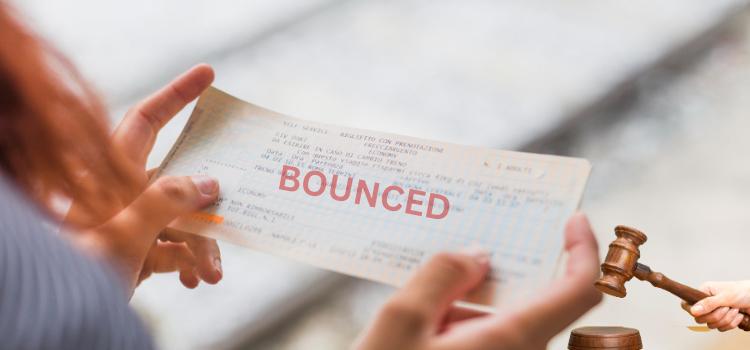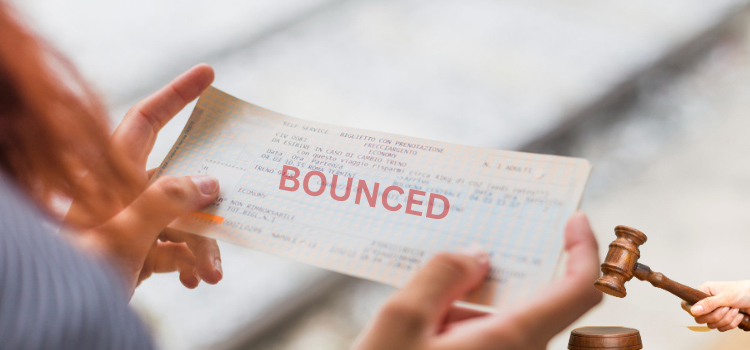How to Draft a Strong Legal Notice for a Cheque Bounce Case

How to Draft a Strong Legal Notice for a Cheque Bounce Case
A cheque bounce is a common financial issue in India, and it carries serious legal consequences. If someone has issued you a cheque that bounced, the first step in seeking redress is to send a Check Bounce Legal Notice. This legal document demands payment of the cheque amount and warns of legal action if the issue isn’t resolved. Crafting a strong legal notice is crucial to ensuring your case stands firm if it proceeds to court. In this article, we’ll guide you through the process of drafting a powerful legal notice for a cheque bounce case.
Understanding the Importance of a Legal Notice in Cheque Bounce Cases
A legal notice is the first official step in initiating a legal process for a cheque bounce under Section 138 of the Negotiable Instruments Act. It serves several purposes:
-
Informs the Issuer: It officially notifies the cheque issuer about the bounced cheque and demands payment.
-
Opportunity for Resolution: The notice gives the issuer a chance to settle the matter without proceeding to court.
-
Legal Requirement: Issuing a notice is a mandatory step before filing a legal case for a bounced cheque.
To ensure your notice is legally sound, it's advisable to consult with professional Cheque Bounce Case Advocates Near Me, or specialized Cheque Bounce Case Lawyers in Noida and Delhi.
Key Elements of a Strong Cheque Bounce Legal Notice
When drafting a legal notice, it’s essential to include certain critical elements to ensure that your document is both legally binding and effective. Here are the main components:
1. Sender’s Information
Start with your full name, address, and contact details. This establishes your identity and makes it clear who is sending the notice.
2. Receiver’s Information
Include the full name, address, and contact information of the cheque issuer. It’s crucial to ensure that this information is accurate.
3. Date of Notice
Clearly mention the date on which the notice is being issued. This date is important as it marks the beginning of the notice period (usually 15 days).
4. Details of the Cheque
Provide all relevant details of the bounced cheque, including:
-
Cheque Number
-
Date of Issuance
-
Bank Name and Branch
-
Amount Mentioned on the Cheque
-
Date on Which It Was Presented
5. Reason for Cheque Bounce
Include the reason provided by the bank for the cheque's dishonor. This could be due to insufficient funds, signature mismatch, account closure, or any other reason specified by the bank.
6. Legal Grounds
Cite Section 138 of the Negotiable Instruments Act as the basis for your legal action. Clearly state that the cheque bounce is a violation of this section, and that legal proceedings will follow if the matter isn’t resolved within the notice period.
7. Demand for Payment
Specify the exact amount due and demand immediate payment. Mention a reasonable deadline (typically 15 days) for the issuer to make the payment and avoid further legal action.
8. Consequences of Non-Payment
Warn the issuer of the legal consequences if the payment is not made within the specified time. This may include filing a case in court and seeking compensation for additional costs and damages.
9. Signature and Contact Information
End the notice with your signature, full name, and any contact details where you can be reached for further communication.
Drafting a Sample Cheque Bounce Legal Notice
Below is a sample template for a cheque bounce legal notice that you can use as a reference:
Date: [Date of Notice]
From: [Your Full Name]
[Your Address]
[Contact Number]
To: [Cheque Issuer’s Full Name]
[Cheque Issuer’s Address]
[Contact Number]
Subject: Legal Notice for Cheque Bounce Under Section 138 of the Negotiable Instruments Act
Dear [Cheque Issuer’s Name],
This is to inform you that the cheque numbered [Cheque Number], dated [Date of Issuance], drawn on [Bank Name, Branch], for an amount of INR [Cheque Amount] has been returned unpaid due to [Reason for Dishonor].
Background:
I had presented the aforementioned cheque to my bank on [Date of Presentation]. However, the cheque was dishonored, and I received a return memo from the bank on [Date of Memo] with the reason: [Reason for Cheque Bounce]. This act constitutes a violation under Section 138 of the Negotiable Instruments Act, 1881.
Demand:
I hereby demand that you pay the cheque amount of INR [Cheque Amount] within 15 days of receiving this notice. Failure to comply will result in the initiation of legal proceedings against you in a competent court of law. In addition, I may seek compensation for additional costs incurred due to the dishonor of the cheque.
Consequences of Non-Payment:
If the payment is not made within the stipulated period, I shall be compelled to file a case under Section 138, seeking appropriate legal remedies, including the recovery of the cheque amount along with interest, court fees, and legal charges.
Yours Sincerely,
[Your Full Name]
[Signature]
[Contact Information]
Common Mistakes to Avoid in Drafting a Cheque Bounce Legal Notice
1. Inaccurate Information
Ensure all details related to the cheque, such as cheque number, amount, and bank details, are correct. Any inaccuracies can weaken your case.
2. Ambiguous Language
Use clear and precise language. Avoid any ambiguous or confusing statements that could be misinterpreted by the recipient or the court.
3. Ignoring Legal Requirements
Consult with expert Trademark Check Bounce Lawyers to ensure your notice meets all legal requirements under the Negotiable Instruments Act.
4. Missing Deadlines
Don’t forget to include the deadlines for payment and the consequences if they are not met. A specific timeframe, typically 15 days, is crucial for the notice to be legally valid.
5. Not Seeking Legal Guidance
Engaging a lawyer for drafting a legal notice can significantly strengthen your case. Whether you are looking for Cheque Bounce Case Lawyers in Noida or Cheque Bounce Case Lawyers in Delhi, professional guidance ensures that your notice complies with the law.
What to Do After Sending a Legal Notice for Cheque Bounce
After sending a legal notice, follow these steps:
1. Keep a Record of Delivery
Use a reliable courier service or send the notice through registered post with an acknowledgment slip. This serves as proof that the notice was delivered to the issuer.
2. Wait for the Response
The cheque issuer has 15 days from the receipt of the notice to settle the payment. Keep a record of any communication during this period.
3. File a Legal Case if Necessary
If the issuer does not respond within the stipulated period, consult with Cheque Bounce Case Advocates Near Me to proceed with filing a complaint in court. The court will then decide the matter based on the evidence and legal arguments.
4. Attend Court Hearings
Once a case is filed, attend all court hearings with the assistance of your lawyer. Ensure you present all relevant documents, including the bounced cheque, bank memo, and a copy of the legal notice.
How LawChef Can Assist with Cheque Bounce Cases
At LawChef, we understand that cheque bounce cases can be complex and stressful. Our team of experienced lawyers specializes in cheque-related disputes, providing comprehensive legal support, from drafting a legal notice to representing you in court.
1. Expert Legal Advice
Our team offers initial consultations to evaluate your case and guide you on the best course of action.
2. Legal Document Drafting
We specialize in drafting legally sound Check Bounce Legal Notices that comply with all legal requirements, increasing the likelihood of a successful resolution.
3. Court Representation
If your case escalates to court, our Cheque Bounce Case Lawyers in Noida and Delhi are equipped to represent you effectively, ensuring that your interests are safeguarded.
4. Out-of-Court Settlements
Whenever possible, we aim for an amicable settlement to save you time and money. Our legal experts are skilled negotiators who can mediate between parties to reach a fair agreement.
Conclusion: Take Legal Action with Confidence
A cheque bounce can have serious consequences, and the first step to resolving the issue is sending a robust legal notice. By understanding the key elements and following best practices, you can strengthen your case and increase your chances of a favorable outcome. For expert guidance and legal assistance, contact LawChef today, and let our team of specialized cheque bounce lawyers handle your case with the expertise it deserves.
- Art
- Causes
- Crafts
- Dance
- Drinks
- Film
- Fitness
- Food
- Spellen
- Gardening
- Health
- Home
- Literature
- Music
- Networking
- Other
- Party
- Religion
- Shopping
- Sports
- Theater
- Wellness
- IT, Cloud, Software and Technology


